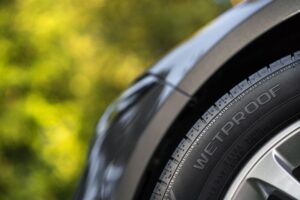Nokian Tyres meets the needs of the growing EV market with energy efficient tires
Nokia, Finland – The global car market is changing as manufacturers aim to develop vehicles that cause a minimum of environmental burden across their lifecycle. Nokian Tyres always seeks to offer drivers advanced solutions that meet their needs. This is why the tire manufacturer follows the industry closely and listens to the needs of consumers.
“The car industry is undergoing a massive transformation, and new electric vehicle models are being introduced at a rapid pace. We are involved in this change and take it into account in our tire development,” says Harri Myllymaa, Head of Product Programs for Nokian Tyres.
There are several new, rising electric vehicle (EV) manufacturers in the United States and China, in particular. Traditional European automakers are also electrifying their models and actively communicating their goals and investments.
“In 2030, up to 60–70% of new cars will be hybrids or electric vehicles. However, the rate of this change varies between countries, so we are monitoring the developments in demand within our business areas,” says Marko Saari, Head of Product Management for Nokian Tyres.
The first cars to be electrified were the large and expensive models. Now, more and more mid-range, smaller models are being offered, and EVs are becoming an everyday thing.
“You are seeing more and more electric versions of small family cars and crossovers on the roads. The strong growth of the EV market is part of our everyday work, and we have been taking it into account in tire development and testing for a long time. For example, the Nokian Tyres Wetproof is a good match for mid-sized EVs,” Marko Saari says.
In addition to closely listening to automakers, Nokian Tyres also pays attention to the consumer market, and product development cooperates with salespeople from various markets.
“The product development team is very aware of the local conditions in all the markets where we operate. Product development has a long time span, as we consider the types of solutions that we could introduce for the benefit of drivers. We constantly work to keep our product range modern,” Harri Myllymaa says.
Tire development is a multi-layered process. It consists of the continued development of products currently on the market, the creation of new product families, and technical innovations. The power, mass, and low noise level of EVs are among the factors guiding development. When the car is nearly silent, low tire noise is a substantial improvement in terms of driving comfort.
The tire’s structure and tread compound as well as the thickness of the tread layer have a major impact on tire noise and interior noise in particular. Furthermore, Nokian Tyres’ SilentDrive™ technology achieves a very low tire noise level. This innovation is utilized in the Nokian Tyres Hakkapeliitta R5 EV tires, for example.
“Each product project is supported by the detailed computer modeling and simulation of the tire. For example, noise modeling enables us to verify that the tire’s structure or tread design will not create distracting noise peaks at specific speeds. We also simulate and model the tire’s handling properties. These are important, as modern EVs have a lot of power,” Myllymaa explains.
Various regulations and decrees also affect product development. For example, a tire’s rolling resistance i.e. energy efficiency may need to be at a specific level right now to achieve the highest A rating, but in a few years, the limit will be tighter.
“In the future, matters relating to the tire’s rolling resistance and sustainable manufacturing will be emphasized further. The properties of tires will also be fitted and tailored even more toward specific EV models. Even though the focus areas in tire development will change, we will never compromise on safety and eco-friendliness,” Saari says.

